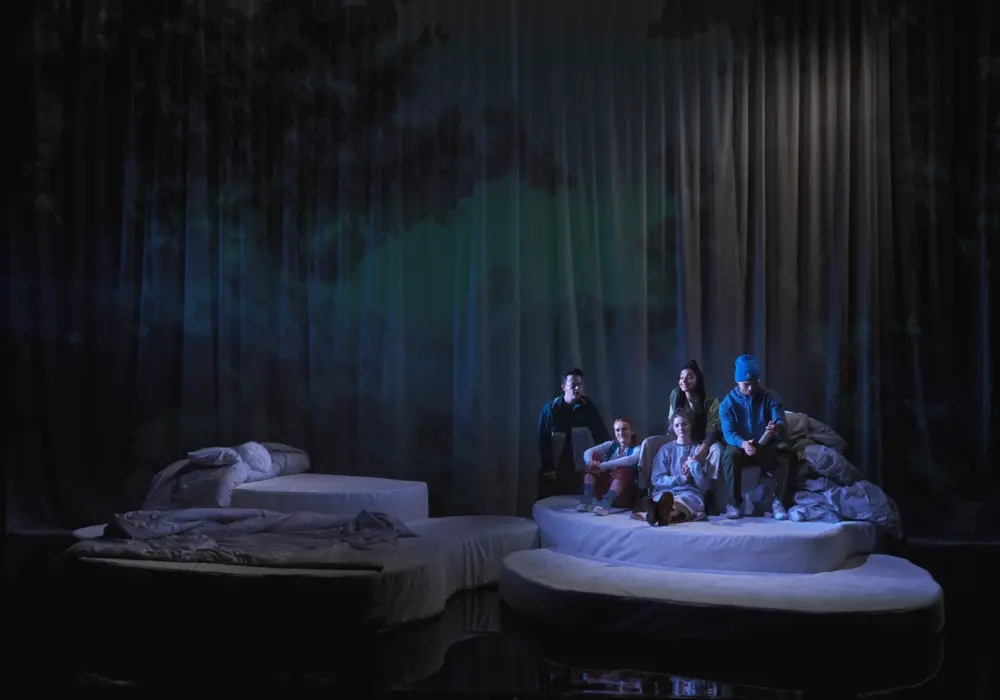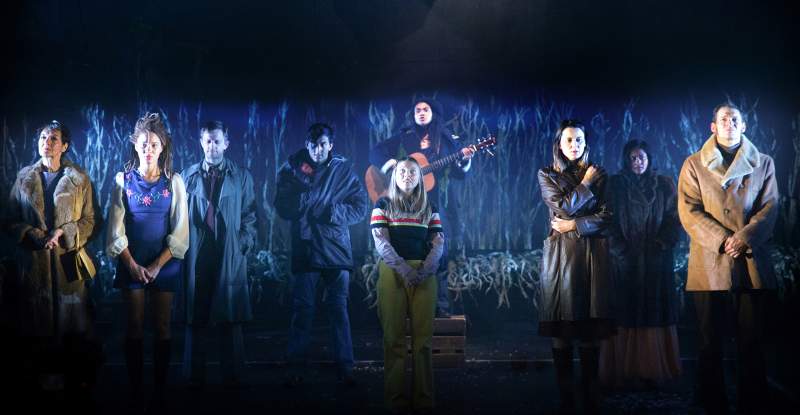Apart from an unresolved puzzle over who or what Orpheus is, Pilot Theatre’s decision to focus A Song for Ella Grey on a group of close-knit friends does justice to David Almond’s book that his own solo play script never could.
It’s time for Ella Grey at Northern Stage. Or, for those of us with long enough memories, Ella Grey round two. For those of us with long enough memories, this is in fact the second time Northern Stage has produced an adaptation of David Almond’s young adult novel for the stage. Seven years ago they did a solo play, written by David Almond himself and directed by then artistic director Lorne Campbell. That came hot off the heels of the publication and acclaim of the original book (not to mention a successful adaptation of another David Almond story over at Live Theatre), but wasn’t one of the most memorable ones. In retrospect, I think this vision was what I call “over-conceptualised” – an abstract staging of what’s already an abstract story, which ended up confusing everybody.
But … Pilot Theatre aren’t giving up that easily, and now they’re having a go. And if anyone’s going to do this right, it’s Pilot Theatre, who’s discovered they’re very good at doing adaptations of young adult novels. This time, it’s Zoe Cooper doing the adaptation – her biggest success to date is probably Jess and Joe Forever. The most obvious change from the original play? It’s gone from a solo play to an ensemble of five. This, I think, goes a long way to addressing two weaknesses of the original play.
Continue reading

 To be honest, I only ended up seeing this by chance. The advertised premise went in two directions: firstly, central character Jodie (played by writer Hannah Sowerby) is coming to think she’s more women than men, but with Penrith being a small Cumbrian town there’s a shortage of women inclined that way – specifically, the mum of one of her school friends. The other premise hinted to is how dull life is in the country. I will admit it was the second strand that got me a bit nervous. I’ve noticed a pattern lately of the theatre community – mostly congregated around the bigger cities – get a bit too keen on plays that look down on people who live in smaller towns. Would this be another hour of the theatrical class exchanging knowing laughter about the country folk and their backward views?
To be honest, I only ended up seeing this by chance. The advertised premise went in two directions: firstly, central character Jodie (played by writer Hannah Sowerby) is coming to think she’s more women than men, but with Penrith being a small Cumbrian town there’s a shortage of women inclined that way – specifically, the mum of one of her school friends. The other premise hinted to is how dull life is in the country. I will admit it was the second strand that got me a bit nervous. I’ve noticed a pattern lately of the theatre community – mostly congregated around the bigger cities – get a bit too keen on plays that look down on people who live in smaller towns. Would this be another hour of the theatrical class exchanging knowing laughter about the country folk and their backward views?




 At the beginning of the play, Laila lives with her liberal-minded parents in Kabul. Even though her brothers fought and died for the US-backed Muhadajeen, the family is still supportive of the Americans, with her father even wearing an American T-shirt. Unfortunately, Kabul is under attack, and before her family can flee, a shell hits the house and both her parents are killed. Laila only survives because of some neighbours who take her in, but what first appears to be an act of kindness soon turns out to be an act of opportunism and the start of the nightmare. Rasheed is a self-obsessed control-freak who dominates his wife, and now wishes to take Laila as his second – something she is powerless to refuse. Mariam is at first angry with Laila for being upstaged, but as Rasheed’s true colours come to light and Laila sticks up for Mariam, the two form a hasty alliance, soon to become a true friendship.
At the beginning of the play, Laila lives with her liberal-minded parents in Kabul. Even though her brothers fought and died for the US-backed Muhadajeen, the family is still supportive of the Americans, with her father even wearing an American T-shirt. Unfortunately, Kabul is under attack, and before her family can flee, a shell hits the house and both her parents are killed. Laila only survives because of some neighbours who take her in, but what first appears to be an act of kindness soon turns out to be an act of opportunism and the start of the nightmare. Rasheed is a self-obsessed control-freak who dominates his wife, and now wishes to take Laila as his second – something she is powerless to refuse. Mariam is at first angry with Laila for being upstaged, but as Rasheed’s true colours come to light and Laila sticks up for Mariam, the two form a hasty alliance, soon to become a true friendship. 
 This needs no introduction. The BBC Three series was phenomenal, arguably the channel’s greatest success since its controversial move to its streaming-only service (and the strongest evidence to date that a web-only BBC Three is a viable service). But before the successful TV show written by and starring Pheobe Waller-Bridge, there were the solo fringe show she wrote herself that started it all off. With the titular role now played by Maddie Rice, it’s been, to no-one’s surprise, performing to sold out houses up and down the country. With me far too disorganised to catch up with anything on television, this was a good opportunity for me see what all the fuss in about.
This needs no introduction. The BBC Three series was phenomenal, arguably the channel’s greatest success since its controversial move to its streaming-only service (and the strongest evidence to date that a web-only BBC Three is a viable service). But before the successful TV show written by and starring Pheobe Waller-Bridge, there were the solo fringe show she wrote herself that started it all off. With the titular role now played by Maddie Rice, it’s been, to no-one’s surprise, performing to sold out houses up and down the country. With me far too disorganised to catch up with anything on television, this was a good opportunity for me see what all the fuss in about.